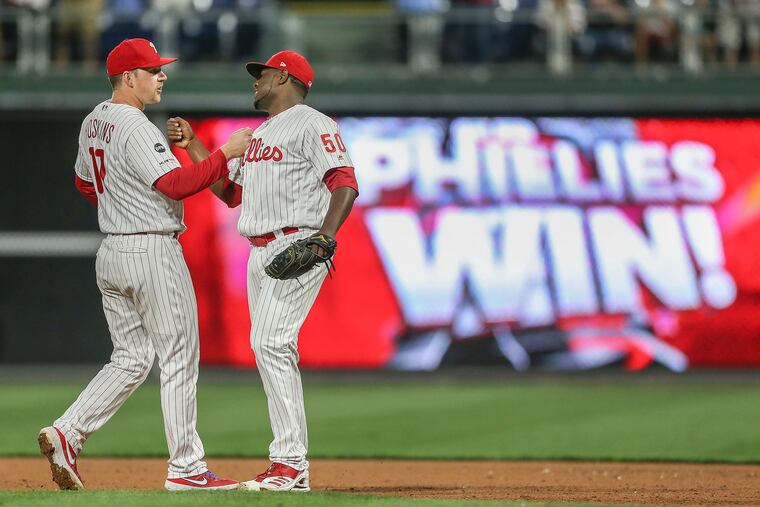The Phillies’ problem isn’t Neris, Hoskins, or Nola. It’s not producing more players like them. | Scott Lauber
Those three players represent the Phillies’ few organizational triumphs in developing homegrown players.

In the course of three games in Atlanta, the Phillies scored six first-inning runs one night, blew three late-inning leads the next, then fell flat in prime time on national television. As with most series, there was a mixture of good, ugly, and bad, respectively.
Somehow, though, one win and two losses against the rival Braves seemed to resurrect three popular talking points, if they ever actually went away:
Héctor Neris should no longer be the closer.
Rhys Hoskins’ latest cold spell is the root of the offense’s inconsistency.
Aaron Nola isn’t an ace.
OK, let’s all take a breath.
It’s true that Neris’ blown save Saturday night was brutal. A grooved fastball that Pablo Sandoval crushed for a two-run home run with the Braves down to their last strike? The only way it could’ve been worse was if Sandoval had won the game rather than tying it. (Then again, that would’ve saved the Phillies from the misery that followed in the 11th and 12th innings.)
There’s also no denying that Hoskins is struggling again. He went 0-for-4 with four strikeouts Friday night, didn’t start the next game, and got dropped Sunday night to seventh in the order, the lowest he batted since his major-league debut in 2017.
And yes, with the Phillies in need of a pick-me-up after their worst loss of the season, their No. 1 starter didn’t give them a chance Sunday night. Nola allowed four runs in the first inning, shades of last year’s season finale at Tampa Bay when he came up small with a playoff berth in the balance.
It was unquestionably a rough weekend for three of the team’s longest-tenured players.
But let’s make something clear: Neris, Hoskins, and Nola aren’t the Phillies’ problem. The Phillies’ problem is not having enough homegrown players who are as good as Neris, Hoskins, and certainly Nola.
» READ MORE: Aaron Nola's not an ace. He's just the Phillies' No. 1. There's a big difference. | Marcus Hayes
It’s not an original thought. Even managing partner John Middleton conceded after last season that the Phillies, but for two brief windows in the last 100 years, haven’t developed enough good players to sustain a contending team. It was an organizational indictment that bears repeating today, tomorrow, and every day until they end the National League’s longest active postseason drought.
Since that last playoff appearance in 2011, 11 players who made their major-league debuts with the Phillies have been worth at least five wins above replacement, as calculated by Baseball-Reference.com. Four (Cole Hamels, Chase Utley, Jimmy Rollins, and Carlos Ruiz) were holdovers from the previous 10-year period. Nola, Hoskins, Neris, Zach Eflin, Odúbel Herrera, César Hernández, and Jerad Eickhoff are the others.
Within that context, Neris, Hoskins, and Nola represent the Phillies’ few developmental triumphs over the last 10 years. In most markets, even notoriously demanding New York and Boston, fans usually cut slack to homegrown players compared to high-priced free-agent imports. Not so around here, where the players who grew up in red pinstripes seem to face even greater scrutiny than those who didn’t.
Look, Neris can accelerate a manager’s heart rate. Pete Mackanin named him the closer in 2017 because he was the best option on a 96-loss team. But for all of the leadoff singles and two-out walks, Neris has converted 81.7% of his save chances since 2017, a rate that’s in line with Josh Hader (82.1%) and Mark Melancon (81.4%).
Maybe the Phillies would be better off with Neris in a setup role. But then who would close? José Alvarado? Doesn’t throw enough strikes. Sam Coonrod? Blew a few big saves down the stretch last year for Gabe Kapler in San Francisco. Connor Brogdon? Maybe someday, but definitely not yet.
So it’s Neris, then. And while he’s far from 2008 Brad Lidge, he isn’t 2009 Lidge either.
» READ MORE: Phillies' Hector Neris is still the closer, Joe Girardi says
Hoskins’ inconsistency can be maddening. At his best, he carries the offense. At his worst, he’s an easy out. The last few weeks have been a snapshot. His 1-for-9, nine-strikeout weekend in Atlanta is part of an 8-for-45, 16-strikeout funk since April 27. But in six games from April 20-26, he belted six homers.
Add it up, and Hoskins ranks seventh in home runs (99), 11th in slugging (.494) and 12th in OPS (.853) among players who have started at least 50% of their games at first base since 2017, which means half the teams in baseball have gotten less production from their primary first baseman.
The facts of life with Neris and Hoskins are that the Phillies take the good with the bad, especially because the former outweighs the latter.
Nola has just been overwhelmingly good. Since the beginning of the 2018 season, he has worked at least seven innings while allowing three or fewer earned runs in 31 starts, tied with Gerrit Cole and more than only Jacob deGrom (43), Max Scherzer (35), and teammate Zach Wheeler (32). All that’s keeping Nola’s critics from regarding him as a classic “ace” is a defining late-season start to push the Phillies into the playoffs. His struggles in September are well-documented, including in this space.
Mostly, though, it’s a matter of semantics. Call Nola whatever you want, but he’s an elite rotation anchor.
And his presence on the roster is a reminder that the issue isn’t finding the flaws in Neris, Hoskins, and Nola, but rather an inability to produce more like them.
» READ MORE: Phillies shortstop Didi Gregorius has struggled defensively this season. Larry Bowa isn't worried. | Scott Lauber